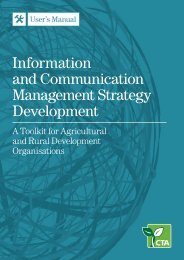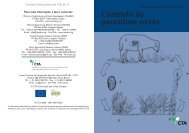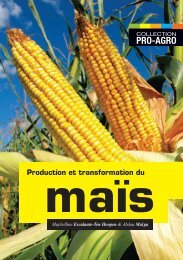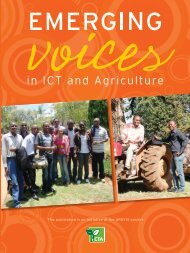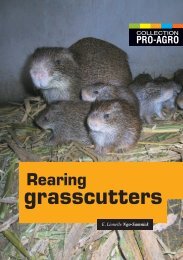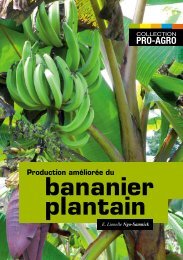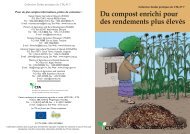Policy framework for Pastoralism in Africa
Policy framework for Pastoralism in Africa
Policy framework for Pastoralism in Africa
- No tags were found...
Create successful ePaper yourself
Turn your PDF publications into a flip-book with our unique Google optimized e-Paper software.
people. The key pr<strong>in</strong>ciples of this <strong>in</strong>itiative were <strong>in</strong> l<strong>in</strong>e with, and contributed to, the strategicpillars of the Commission, namely promotion of peace and security, cooperation, partnershipand development, shared vision and <strong>in</strong>stitutional capacity strengthen<strong>in</strong>g.This draft <strong>Policy</strong> Framework <strong>for</strong> <strong>Pastoralism</strong> <strong>in</strong> <strong>Africa</strong> is a result of a series of consultationsand regional assessments of pastoralism conducted s<strong>in</strong>ce mid-2007. A Specialist Task<strong>for</strong>ce wasestablished follow<strong>in</strong>g the <strong>in</strong>ception workshop <strong>in</strong> Isiolo, and the Task<strong>for</strong>ce members were actively<strong>in</strong>volved <strong>in</strong> articulat<strong>in</strong>g the issues and guid<strong>in</strong>g the process and the strategy. Consultants haveundertaken the regional assessments <strong>in</strong> each of the five regions of <strong>Africa</strong>, and the regionalassessment reports were reviewed and validated <strong>in</strong> a consultation workshop held <strong>in</strong> April 2010,<strong>in</strong> Ouagadougou, Burk<strong>in</strong>a Faso. These processes led to the <strong>for</strong>mulation of the development ofthe draft policy <strong>framework</strong>, which was discussed and validated <strong>in</strong> a stakeholders consultationworkshop held <strong>in</strong> September-October 2010, <strong>in</strong> Nairobi, Kenya.1.1.2 Scope and justification <strong>for</strong> a pan-<strong>Africa</strong>n pastoral policya. Scope<strong>Policy</strong> has always been at the centre of successes and failures <strong>in</strong> the development of human communities.Similarly, policy can either promote or h<strong>in</strong>der economic and social development <strong>in</strong> pastoralareas of <strong>Africa</strong>. Specifically, the policy and <strong>in</strong>stitutional environment determ<strong>in</strong>es access to theresources of these areas and there<strong>for</strong>e, has a significant impact on equity, productivity and livelihoods.Limited or uncerta<strong>in</strong> resource tenure and access to, or ownership of land, water and otherresources is a long-term, fundamental constra<strong>in</strong>t <strong>for</strong> pastoralism. In addition, limited <strong>for</strong>mal education,health and communication facilities, <strong>in</strong>appropriate market development, and poor accessto livestock and other services can lead to discontent, generate <strong>in</strong>justice and further promote conflict.These problems can also lead to non-susta<strong>in</strong>able resource use and environmental degradation. Incontrast, appropriate pro-pastoral policy and <strong>in</strong>stitutional re<strong>for</strong>ms can empower pastoral peopleand promote equitable access to resources, facilities and services, and guarantee susta<strong>in</strong>able landuse and environmental management.It is <strong>in</strong>creas<strong>in</strong>gly accepted that livestock rear<strong>in</strong>g is the dom<strong>in</strong>ant and rational economic enterprise<strong>in</strong> pastoral communities, but policies to address pastoral issues must go beyond those related tolivestock production, market<strong>in</strong>g and trade. Pastoralists also need supportive policies on criticalissues such as healthcare, education, land tenure, women’s rights, governance, ethnicity andreligion. Furthermore, the scope of policy <strong>in</strong> many areas, especially policies on pastoral mobility,environment and conflict, must range from local policies to regional policy harmonization acrossborders. This scope recognizes that pastoralist ecosystems often transcend national borders, andthat movement with<strong>in</strong> these systems is economically and ecologically rational.b. JustificationGiven the transnational character of pastoralism and the extreme and worsen<strong>in</strong>g levels of food<strong>in</strong>security and vulnerability with<strong>in</strong> <strong>Africa</strong>n pastoral communities, a pan-<strong>Africa</strong>n policy on pastoralismis long overdue. Available <strong>in</strong><strong>for</strong>mation <strong>in</strong>dicates that pastoralists are among the most politicallyand economically marg<strong>in</strong>alized communities. They have decreas<strong>in</strong>g access to the natural resourceson which their livelihoods depend, and very limited access to basic socio-economic services andSecur<strong>in</strong>g, Protect<strong>in</strong>g and Improv<strong>in</strong>g the Lives, Livelihoods and Rights of Pastoralist Communities9




